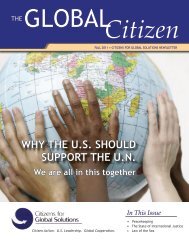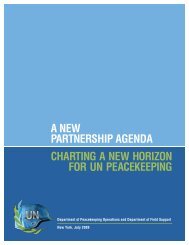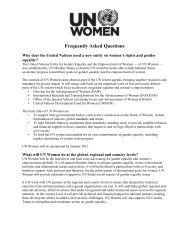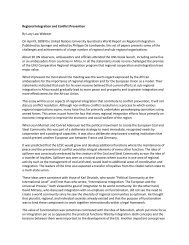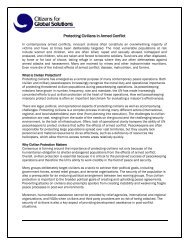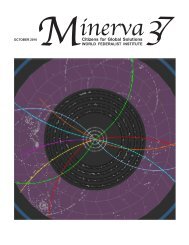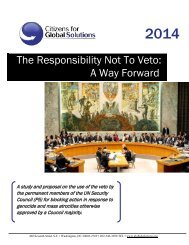Minerva, Spring 2008 (Volume 32) - Citizens for Global Solutions
Minerva, Spring 2008 (Volume 32) - Citizens for Global Solutions
Minerva, Spring 2008 (Volume 32) - Citizens for Global Solutions
You also want an ePaper? Increase the reach of your titles
YUMPU automatically turns print PDFs into web optimized ePapers that Google loves.
NOTES: Human Security ~<br />
Connectivity and Responsibility<br />
From the Center on International Cooperation<br />
at New York University, Richard<br />
Gowan writes (in the Stanley Foundation’s<br />
): “One of the most worrying<br />
trends in current American political<br />
debate is a creeping isolationism. This is<br />
not the isolationism of the 1930s — the<br />
principled, if misguided, belief that the<br />
US should cut itself off from European<br />
power politics — but a weary sense that<br />
international engagement just isn’t working.<br />
… Yet this trend is balanced by a residual<br />
sense that the US has global commitments<br />
it cannot desert yet — and these<br />
demand a better mix of American soft and<br />
hard power. … [I]n the wake of the Iraqi<br />
debacle, the country’s leading politicians<br />
and policy intellectuals are turning toward<br />
a concept that wouldn’t have got a hearing<br />
in Washington in 2003. This is ‘human<br />
security’—the idea that a country’s<br />
<strong>for</strong>eign policy should not just be about<br />
defending its national interests but also<br />
protecting vulnerable people worldwide<br />
from the risks of poverty, disease, natural<br />
disasters, and mass slaughter. It’s a very<br />
broad idea and one that’s too often dismissed<br />
as naïve.” He attributes that to the<br />
notion’s increasing popularity in Canada<br />
and Europe — where in 2004 a high-level<br />
panel proposed an EU “Human Security<br />
Force” of 15,000 troops, police, and humanitarian<br />
workers and where French<br />
Foreign Minister Bernard Kouchner is a<br />
strong proponent of the “Responsibility<br />
to Protect”.<br />
But “the reality is that there is a hardheaded<br />
case <strong>for</strong> the idea”, asserts Gowan,<br />
“and it is one that may prove increasingly<br />
urgent in the years ahead. International<br />
risk analysts agree that some of the most<br />
dangerous crises of the near future will<br />
… involve … a mixture of unpredictable<br />
threats … [that] demand a vast variety of<br />
responses.” Even trickier, warns P.H. Liotta,<br />
Executive Director of the Pell Center<br />
<strong>for</strong> International Relations and Public<br />
Policy, “not all security issues involve<br />
‘threats’; rather, the notion of vulnerabilities<br />
is as serious to some peoples, and<br />
some regions, as the more familiar concept<br />
of threat” (Pell conference, “The Future<br />
of ‘Human Security’”, June 2005).<br />
While arguing that these difficulties must<br />
be faced without further delay, Gowan’s<br />
opinion is that “it would be electoral suicide<br />
to lay out frankly the litany of current<br />
global challenges, the costs involved<br />
in confronting them, and the difficulties<br />
in predicting which risks will turn into<br />
real crises”. Not to mention the traditional<br />
toughness of making the case <strong>for</strong> developing<br />
“a sense of mutual trust based on<br />
effective diplomacy through the UN and<br />
other international organizations” — crucial<br />
“not least because the UN’s own assets<br />
include essential agencies involved<br />
in resolving human security issues, from<br />
the World Food Programme to the World<br />
Health Organization”.<br />
Much discussion turns on questions of<br />
ascendancy among polarities. For example,<br />
Parag Khanna, author of The Second<br />
World: Empires and Influence in the New<br />
<strong>Global</strong> Order (March <strong>2008</strong>), in his controversial<br />
turn-of-the-year New York Times<br />
essay “Waving Goodbye to Hegemony”,<br />
commented on the American electoral<br />
campaign’s retro weirdness of both parties<br />
“bickering about where and how to intervene,<br />
whether to do it alone or with allies<br />
and what kind of world America should<br />
lead. … But the distribution of power in<br />
the world has fundamentally altered. …<br />
The EU may uphold the principles of the<br />
United Nations that America once dominated,<br />
but how much longer will it do so<br />
as its own social standards rise far above<br />
this lowest common denominator? And<br />
why should China or other Asian countries<br />
become ‘responsible stakeholders’,<br />
in <strong>for</strong>mer Deputy Secretary of State Robert<br />
Zoellick’s words, in an American-led<br />
international order when they had no seat<br />
at the table when the rules were drafted?<br />
Even as America stumbles back toward<br />
multilateralism, others are walking away<br />
from the American game and playing by<br />
their own rules.” In this view, “America’s<br />
standing in the world remains in steady<br />
decline. Why? Weren’t we supposed to<br />
reconnect with the United Nations and reaffirm<br />
to the world that America can, and<br />
should, lead it to collective security and<br />
prosperity?”<br />
Another example: “Is the balance of global<br />
power slipping away from the United<br />
States and its European allies?” asked a<br />
7 • <strong>Minerva</strong> #<strong>32</strong> • June <strong>2008</strong><br />
<strong>for</strong>um held by the New America Foundation<br />
in Washington DC on 17 April to<br />
discuss ‘the future of American Leadership<br />
in a ‘World Without the West’”, involving<br />
Flyntt Leverett (Senior Fellow of<br />
the foundation), Fred Kempe (President<br />
& CEO, Atlantic Council), Steven Weber<br />
(Director, Institute of International Studies,<br />
University of Cali<strong>for</strong>nia, Berkeley),<br />
and others. Sameer Lalwani (Policy Analyst,<br />
American Strategy Program) subsequently<br />
blogged in The Washington Note<br />
that they “discussed the ‘World Without<br />
West’ thesis described in these lines:<br />
The landscape of globalization<br />
now looks like this: While connectivity<br />
<strong>for</strong> the globe as a whole has increased in<br />
the last twenty years, it is increasing at<br />
a much faster rate among countries outside<br />
the Western bloc. The World Without<br />
the West is becoming preferentially and<br />
densely interconnected. This creates the<br />
foundation <strong>for</strong> the development of a new,<br />
parallel international system, with its<br />
own distinctive set of rules, institutions,<br />
ways of doing things — and currencies of<br />
power.<br />
The World Without the West,<br />
like any political order, is made up of two<br />
ingredients: A set of ideas about governance<br />
and a set of power resources that<br />
enable, embed and occasionally en<strong>for</strong>ce<br />
those ideas. This alternative order rests<br />
on wealth drawn from natural resources<br />
and industrial production (along with the<br />
management expertise applied to those<br />
capabilities). And it proposes to manage<br />
international politics through a neo-Westphalian<br />
synthesis comprised of hard-shell<br />
states that bargain with each other about<br />
the terms of their external relationships,<br />
but staunchly respect the rights of each to<br />
order its own society, politics and culture<br />
without external interference. Neither<br />
of these elements by itself would make<br />
<strong>for</strong> a concrete alternative to the Western<br />
system, but together they synergistically<br />
stabilize into a robust political-economic<br />
order.”<br />
“The implications are grave,” comments<br />
Sameer Lalwani. “Weber suggested at minimum,<br />
the degree of interaction amongst<br />
the non-west orbit af<strong>for</strong>ds increased bargaining<br />
power on geoeconomic and geopolitical<br />
fronts when dealing with the US<br />
and the West, but at maximum, it means



